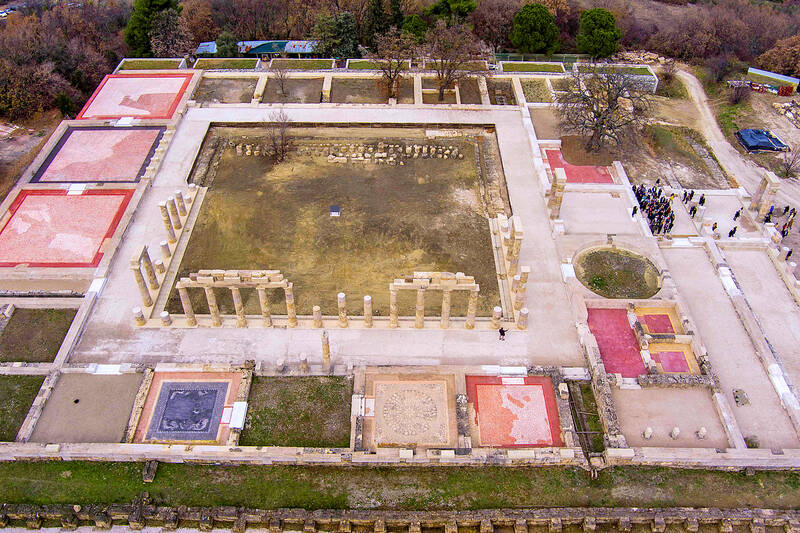It was the largest building of classical Greece: the palace where Alexander the Great was proclaimed king before he launched a conquest that took him as far as modern-day Afghanistan.
The Palace of Aigai in northern Greece was fully reopened on Friday following a 16-year renovation that cost more than 20 million euros (US$21.89 million) and included financial support from the EU.
It was built more than 2,300 years ago during the reign of Alexander’s father, Phillip II of Macedon, who had transformed the kingdom of Macedonia into a dominant military power of ancient Greece. Aigai was its royal capital.

Photo: AFP
“After many years of painstaking work, we can reveal the palace... What we are doing today is an event of global importance,” Greek Prime Minister Kyriakos Mitsotakis said at an on-site inauguration event on Friday.
The palace contained colonnaded courtyards, courts, places of worship and spacious banquet halls, with floors decorated with patterned marble and intricate mosaics. The building covered a ground area of 15,000m2 — a little under the area covered by the US Capitol building.
Shaped like two adjoining, unequally sized square doughnuts, the Palace of Aigai was the administrative and spiritual center of the kingdom. The palace remnants and nearby royal tombs are a UN World Heritage Site at the area next to the modern village of Vergina. Like a three-dimensional jigsaw puzzle, the marble columns were resurrected by fitting pieces of stone unearthed in the ruins together with replica replacement parts.
About 65km southwest of the port city of Thessaloniki in northern Greece, Aigai drew international attention in the late 1970s during burial mound excavations in the area of rolling green hills with patches of wild poppies and daffodils.
The late Greek archeologist Manolis Andronikos led the digs and discovered the royal tombs, recovering a gold casket and other gold artifacts, as well as bones widely believed to belong to Philip II. The discoveries revealed the sophistication of the ancient Macedonians, who had often been sidelined in historical accounts by attention on Athens.
Angeliki Kottaridi was still a university archeology student when she joined the project as a young assistant. She devoted her life’s work to the excavations and decades later became the driving force behind the new museum at Aigai, which opened a year ago, along with the palace restoration.
She retired on Sunday last week as head of the region’s archeological service and was honored at Friday’s ceremony.
“What you discover is stones scattered in the dirt, and pieces of mosaics here and there,” Kottaridi told state television ahead of Friday’s inauguration.
“Then you have to assemble things and that’s the real joy of the researcher,” Kottaridi said. “So when people ask me what makes me happy, I tell them it’s not the moment something is revealed. It’s the moment you realize you can take the knowledge one step further.”
The renovated site is to open to the public today.

South Korea would soon no longer be one of the few countries where Google Maps does not work properly, after its security-conscious government reversed a two-decade stance to approve the export of high-precision map data to overseas servers. The approval was made “on the condition that strict security requirements are met,” the South Korean Ministry of Land, Infrastructure and Transport said. Those conditions include blurring military and other sensitive security-related facilities, as well as restricting longitude and latitude coordinates for South Korean territory on products such as Google Maps and Google Earth, it said. The decision is expected to hurt Naver and Kakao

MONEY GRAB: People were rushing to collect bills scattered on the ground after the plane transporting money crashed, which an official said hindered rescue efforts A cargo plane carrying money on Friday crashed near Bolivia’s capital, damaging about a dozen vehicles on highway, scattering bills on the ground and leaving at least 15 people dead and others injured, an official said. Bolivian Minister of Defense Marcelo Salinas said the Hercules C-130 plane was transporting newly printed Bolivian currency when it “landed and veered off the runway” at an airport in El Alto, a city adjacent to La Paz, before ending up in a nearby field. Firefighters managed to put out the flames that engulfed the aircraft. Fire chief Pavel Tovar said at least 15 people died, but

THE TRAGEDY OF PUNCH: Footage of the seven-month-old Japanese macaque has gone viral online after he was rejected by his mother and formed a bond with a soft toy A baby monkey in Japan has captured hearts around the world after videos of him being bullied by other monkeys and rejected by his mother went viral last week. Punch, a Japanese macaque, was born in July last year at Ichikawa City Zoo. He has drawn international attention after zookeepers gave him a stuffed orangutan toy after he was abandoned by his mother. Without maternal guidance to help him integrate, Punch has turned to the toy for comfort. He has been filmed multiple times being dragged and chased by older Japanese macaques inside the enclosure. Early clips showed him wandering alone with

Australian Prime Minister Anthony Albanese yesterday said he did not take his security for granted, after he was evacuated from his residence for several hours following a bomb threat sent to a Chinese dance group. Albanese was evacuated from his Canberra residence late on Tuesday following the threat, and returned a few hours later after nothing suspicious was found. The bomb scare was among several e-mails threatening Albanese sent to a representative of Shen Yun, a classical Chinese dance troupe banned in China that is due to perform in Australia this month, a spokesperson for the group said in a statement. The e-mail